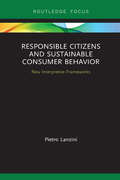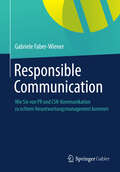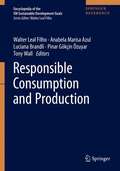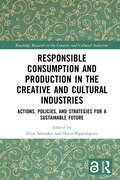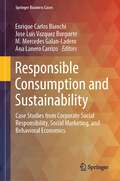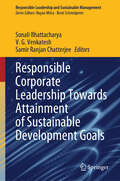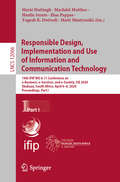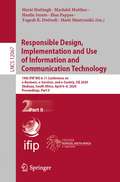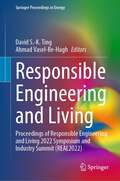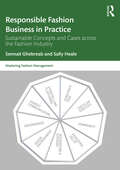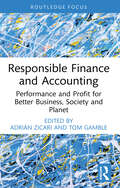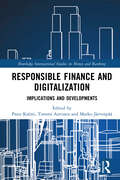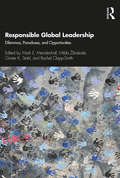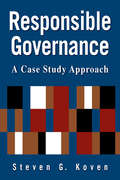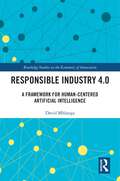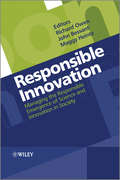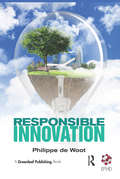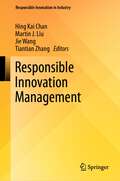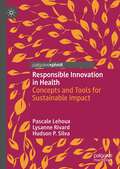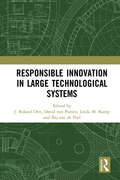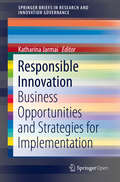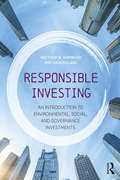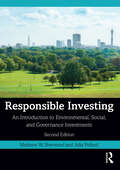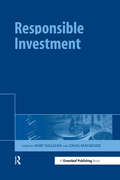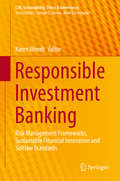- Table View
- List View
Responsible Citizens and Sustainable Consumer Behavior: New Interpretive Frameworks (Routledge-SCORAI Studies in Sustainable Consumption)
by Pietro LanziniThere is broad consensus on the need to shift to a new paradigm of lifestyles and economic development, given the un-sustainability of current patterns. Given this, research on consumer behavior is to play a crucial role in shedding light on the motives underpinning the adoption of responsible behaviors. Stemming from a thorough discussion of existing approaches, this book argues that the perspective of analysis has to be modified. First, acknowledging that a profile of the responsible consumer does not exist since all of us can be more or less sustainable and environment-friendly: the sustainability of an individual should not be considered as given, being something dynamic that changes according to both subjective and contextual factors. Moreover, the book hypothesises that integrating dimensions and perspectives that have been so far overlooked by mainstream research will help deconstruct responsible behaviors adopting a flexible and holistic approach. Relevant policy implications are discussed, and empirical research on responsible behaviors is illustrated. This book will be of great interest to students and scholars of consumer behavior, sustainable consumption, environmental psychology and environmental studies in general.
Responsible Communication: Wie Sie von PR und CSR-Kommunikation zu echtem Verantwortungsmanagement kommen
by Gabriele Faber-WienerIn Zeiten von Finanzkrise, wachsender Vernetzung, Wertewandel und einer Gesellschaft, die Unternehmen, Politik und Institutionen immer mehr hinterfragt, gewinnt Transparenz zunehmend an Bedeutung. Speziell dort, wo Corporate Social Responsibility (CSR) zum integralen Bestandteil des Wirtschaftens herangewachsen ist, wird mehr denn je klar: Viele herkömmliche, gelernte Rezepte greifen nicht mehr, um Glaubwürdigkeit, Vertrauen und Legitimation in der Öffentlichkeit zu bewahren. Offenheit und Flexibilität im Management sind gefragt - und eine neue Qualität in der Kommunikation. Kommunikation ist ein Spiegel der Haltung. Unternehmen und Institutionen, die Nachhaltigkeit und Verantwortung in ihrem Wertekatalog verankert haben, müssen sich bewusst sein, dass diese proklamierten Werte verstärkt hinterfragt und auf ihre Glaubwürdigkeit abgeklopft werden. Verantwortliches Management verlangt nach einer wertebasierten, zukunftsfähigen und diskursorientierten Kommunikation. Dies ist Kern dieses Buches. Es setzt sich mit den Voraussetzungen für glaubwürdige Kommunikation zusammen, untersucht die Praxis der PR und CSR-Kommunikation auf ihre Glaubwürdigkeit hin und entwickelt ein neues Konzept, das die Verantwortung der Kommunikatoren ausdehnt: weg von einer zumeist eindimensionalen Positiv-Kommunikation, hin zum offenen und selbstkritischen Diskurs. Responsible Communication heißt: Sie handeln und kommunizieren: ausgewogen - selbstkritisch - ethik-basiert - dialogisch Nur dann ist Glaubwürdigkeit gewährleistet - frei nach der Devise "Verantwortung heißt Antwort geben"
Responsible Consumption and Production (Encyclopedia of the UN Sustainable Development Goals)
by Walter Leal Filho Tony Wall Luciana Brandli Anabela Marisa Azul Pinar Gökçin ÖzuyarThe problems related to the process of industrialisation such as biodiversity depletion, climate change and a worsening of health and living conditions, especially but not only in developing countries, intensify. Therefore, there is an increasing need to search for integrated solutions to make development more sustainable. The United Nations has acknowledged the problem and approved the “2030 Agenda for Sustainable Development”. On 1st January 2016, the 17 Sustainable Development Goals (SDGs) of the Agenda officially came into force. These goals cover the three dimensions of sustainable development: economic growth, social inclusion and environmental protection. The Encyclopedia of the UN Sustainable Development Goals comprehensively addresses the SDGs in an integrated way. It encompasses 17 volumes, each one devoted to one of the 17 SDGs. This volume addresses SDG 12, namely "Ensure sustainable consumption and production patterns" and contains the description of a range of terms, which allows a better understanding and fosters knowledge. Concretely, the defined targets are:Implement the 10-Year Framework of Programmes on Sustainable Consumption and Production Patterns, all countries taking action, with developed countries taking the lead, taking into account the development and capabilities of developing countriesAchieve the sustainable management and efficient use of natural resourcesHalve per capita global food waste at the retail and consumer levels and reduce food losses along production and supply chains, including post-harvest lossesAchieve the environmentally sound management of chemicals and all wastes throughout their life cycle, in accordance with agreed international frameworks, and significantly reduce their release to air, water and soil in order to minimize their adverse impacts on human health and the environmentSubstantially reduce waste generation through prevention, reduction, recycling and reuseEncourage companies, especially large and transnational companies, to adopt sustainable practices and to integrate sustainability information into their reporting cyclePromote public procurement practices that are sustainable, in accordance with national policies and priorities Ensure that people everywhere have the relevant information and awareness for sustainable development and lifestyles in harmony with nature Support developing countries to strengthen their scientific and technological capacity to move towards more sustainable patterns of consumption and productionDevelop and implement tools to monitor sustainable development impacts for sustainable tourism that creates jobs and promotes local culture and productsRationalize inefficient fossil-fuel subsidies that encourage wasteful consumption by removing market distortions, in accordance with national circumstances, including by restructuring taxation and phasing out those harmful subsidies, where they exist, to reflect their environmental impacts, taking fully into account the specific needs and conditions of developing countries and minimizing the possible adverse impacts on their development in a manner that protects the poor and the affected communitiesEditorial BoardMedani P. Bhandari, Luciana Londero Brandli, Morgane M. C. Fritz, Ulla A. Saari, Leonardo L. Sta Romana
Responsible Consumption and Production in the Creative and Cultural Industries: Actions, Policies, and Strategies for a Sustainable Future (Routledge Research in the Creative and Cultural Industries)
by Elisa SalvadorNo sector can escape the challenge of the climate crisis. This book brings together a team of academic experts to urgently examine the intersection of sustainability and the Cultural and Creative Industries (CCIs), particularly within the framework of Sustainable Development Goal 12 (SDG 12): Responsible Consumption and Production.Investigating responsible consumption and production across the CCIs, this book explores the role of public policy, funding bodies and other institutional actors in the sustainable transition. It also links CCIs with the development of sustainable tourism and sustainable tourism cities and provides evidence on the role of CCIs in producing positive change in people’s behaviours, consumption patterns, and perceptions of the climate emergency. Transformations towards circular economy models in the CCIs are also analysed. In illuminating how the CCIs’ are embracing the challenge of sustainable development, the chapters in this book highlight best practices and sustainable solutions across a range of geographic and cultural contexts.This book will be a valuable resource for researchers, academics and advanced students with an interest in sustainable business practices, especially their application to the CCIs.
Responsible Consumption and Sustainability: Case Studies from Corporate Social Responsibility, Social Marketing, and Behavioral Economics (Springer Business Cases)
by M. Mercedes Galan-Ladero Enrique Carlos Bianchi Jose Luis Vazquez Burguete Ana Lanero CarrizoThis book presents high-quality cases on the actions carried out by companies to minimize the social and environmental impact of the products (goods and services) they launch on the market. It also highlights the education campaigns that promote behavioral changes and new sustainable lifestyles that have been developed by all kinds of organizations (Public Administration, NGOs, and businesses), mainly from Corporate Social Responsibility, Social Marketing, and Behavioral Economics perspectives. International cases help students learn how management and corporate strategy, and the appropriate marketing strategies, can be designed with an aim to achieve responsible consumption and create sustainable lifestyles.
Responsible Corporate Leadership Towards Attainment of Sustainable Development Goals (Responsible Leadership and Sustainable Management)
by Samir Ranjan Chatterjee V. G. Venkatesh Sonali BhattacharyaThis book looks into “responsible leadership” as leader’s proactive actions towards attainment of sustainable development goals and overall wellbeing of organization and society. The book covers both theoretical and practical approaches towards responsible leadership in the first module. The second module consists of chapters linking responsible leadership with various aspects of sustainable business practices such as sustainable supply chain management, green marketing, green HRM, green finance and sustainable education through digitization. The third module covers challenges to responsible leadership in various sectors such as education, agriculture, services, renewable energy and urban and rural development under a dynamic business environment. The fourth section discusses leadership roles in strategizing and implementing sustainable practices within the organization. Finally the concluding module contains critical reviews and interpretations of the perspectives on harnessing powerof HR transformation for long term sustainability and well-being.
Responsible Design, Implementation and Use of Information and Communication Technology: 19th IFIP WG 6.11 Conference on e-Business, e-Services, and e-Society, I3E 2020, Skukuza, South Africa, April 6–8, 2020, Proceedings, Part I (Lecture Notes in Computer Science #12066)
by Yogesh K. Dwivedi Matti Mäntymäki Marié Hattingh Machdel Matthee Hanlie Smuts Ilias PappasThis two-volume set constitutes the proceedings of the 19th IFIP WG 6.11 Conference on e-Business, e-Services, and e-Society, I3E 2020, held in Skukuza, South Africa, in April 2020.* The total of 80 full and 7 short papers presented in these volumes were carefully reviewed and selected from 191 submissions. The papers are organized in the following topical sections: Part I: block chain; fourth industrial revolution; eBusiness; business processes; big data and machine learning; and ICT and education Part II: eGovernment; eHealth; security; social media; knowledge and knowledge management; ICT and gender equality and development; information systems for governance; and user experience and usability*Due to the global COVID-19 pandemic and the consequential worldwide imposed travel restrictions and lockdown, the I3E 2020 conference event scheduled to take place in Skukuza, South Africa, was unfortunately cancelled.
Responsible Design, Implementation and Use of Information and Communication Technology: 19th IFIP WG 6.11 Conference on e-Business, e-Services, and e-Society, I3E 2020, Skukuza, South Africa, April 6–8, 2020, Proceedings, Part II (Lecture Notes in Computer Science #12067)
by Yogesh K. Dwivedi Matti Mäntymäki Marié Hattingh Machdel Matthee Hanlie Smuts Ilias PappasThis two-volume set constitutes the proceedings of the 19th IFIP WG 6.11 Conference on e-Business, e-Services, and e-Society, I3E 2020, held in Skukuza, South Africa, in April 2020.* The total of 80 full and 7 short papers presented in these volumes were carefully reviewed and selected from 191 submissions. The papers are organized in the following topical sections: Part I: block chain; fourth industrial revolution; eBusiness; business processes; big data and machine learning; and ICT and education Part II: eGovernment; eHealth; security; social media; knowledge and knowledge management; ICT and gender equality and development; information systems for governance; and user experience and usability*Due to the global COVID-19 pandemic and the consequential worldwide imposed travel restrictions and lockdown, the I3E 2020 conference event scheduled to take place in Skukuza, South Africa, was unfortunately cancelled.
Responsible Engineering and Living: Proceedings of Responsible Engineering and Living 2022 Symposium and Industry Summit (REAL2022) (Springer Proceedings in Energy)
by David S.-K. Ting Ahmad Vasel-Be-HaghThis book includes the proceedings of the Responsible Engineering and Living 2022 Symposium and Industry Summit. Molière holds each of us accountable when he asserted that, “It is not only for what we do that we are held responsible, but also for what we do not do.” Responsible Engineering and Living 2022 (REAL2022) strived to inspire every individual to practise and foster responsible engineering and living. Its proceedings brings all stakeholders, enthusiasts and experts from academia, industry, policy arenas, and general public, together to discuss challenges, sharpen existing solutions, and formulate novel means to advance responsible engineering and living. This symposium disseminates recent progress and promote collaborations to maximize opportunities for innovative solutions. Topics of interest include resource and energy conservation, waste reduction, nature-friendly engineering and architecture, and sustainable vibrant living.
Responsible Fashion Business in Practice: Sustainable Concepts and Cases across the Fashion Industry (Mastering Fashion Management)
by Sennait Ghebreab Sally HealeThis unique text offers a holistic, insightful and timely exploration of sustainable practices across the fashion industry. The book takes the reader logically through each part of the authors’ new Responsible 9 Framework™, providing a clear perspective and examples for each component. The framework thoroughly explains the move away from a singular product commercial focus to a Conscious Item approach and Circular Services business mindset. An organisation’s people are at the heart of the new framework and have therefore been rebranded as Community. Next addressed is the Perceived Value of an item or brand, and how sustainable pricing initiatives actively influence consumer purchase. Insights into Accountable Systems are reviewed to examine the importance of responsible processes when considering and integrating a successful, sustainable supply chain into a fashion business. The section on Governance looks at the different global organisations available to fashion brands and customers alike, which support their transition into a responsible and sustainable future existence. The last two sections of the framework are labelled Storytelling Platforms and Honest Communication, where transparent and honest strategies are highlighted and discussed from a viewpoint of how modern brands are engaging and connecting to the new conscious consumer. For each of the nine aspects, contemporary case studies from global brands such as Stella McCartney, Zalando and Arc'teryx, alongside insights from current, leading experts within the fashion world, bring the theory to life. Showing how sustainability has been integrated throughout the entirety of the fashion business, this textbook is perfect for advanced undergraduate and postgraduate students Fashion Management, Fashion Brand Management and Fashion Marketing, as well as reflective leaders and practitioners within the industry.
Responsible Finance and Accounting: Performance and Profit for Better Business, Society and Planet (Routledge COBS Focus on Responsible Business)
by Adrián Zicari Tom GambleThe UN Sustainable Development Goals, an increasing interest in Environmental, Social, and Governance factors, the climate crisis, stakeholder pressure, the lessons of corporate scandals, and the COVID-19 pandemic have triggered a massive change in how companies approach finance and accounting practices. From being a ‘nice-to-have’ to becoming a ‘must-have’, Responsible Finance and Accounting positions itself as a key pillar in tomorrow’s better world for business, society, and planet. In this book, leading researchers and practitioners in the field of corporate social responsibility, from the schools and corporate partners of the Council on Business & Society, give you key insights into green finance and social and environmental reporting, national, international and corporate stakes in green taxonomy and carbon tax, and triple capital accounting. It also details how to model effective and low-cost social impact reporting, ethics in finance and accounting, and strategies for microfinance and finance-related social innovation. Each insight is accompanied by key takeaways, food for thought, and micro-case study sections. This accessible book will be a valuable resource for scholars, instructors, and upper-level students across finance and accounting as well as corporate social responsibility and business ethics. It will also serve as a guide for professionals aiming to deepen their understanding of new finance and accounting practice.
Responsible Finance and Digitalization: Implications and Developments (Routledge International Studies in Money and Banking)
by Panu Kalmi Tommi Auvinen Marko JärvenpääThe aftermath of the 2008 crisis has substantially increased the regulation of banks and insurance companies and curtailed their risk taking, which has shifted much of the risk to their clients: firms and consumers. At the same time, digitalization has encouraged the entry of new firms combining finance and technological innovation, a phenomenon known as FinTech. The emergence of non-bank financial entities has contributed to the fragmentation of financial services, and also opened up new markets. Furthermore, the growing emphasis on corporate social responsibility has made it increasingly important for financial organizations to care about their public image. Drawing together these diverse strands, this book examines how the financial sector is evolving and how the existing actors are adapting to the institutional change and to the challenges from new actors and competitors. It also addresses the issue of how financial organizations are providing fixes to the challenges at the systemic level and how a healthier, more diverse and socially responsible financial sector is beneficial to the operations of the market economy as a whole. While there are books that address each of these issues, and also books that look at organizational diversity, there are few that investigate their interconnectedness. Responsible Finance and Digitalization offers a topical overview of the changes that are taking place in the financial sector and how the financial sector itself can contribute to solving global challenges. It equips both students (at MBA and other levels) and practitioners with analytical tools to reflect on this change and to take appropriate action to ensure that their organization can successfully navigate it and create value.
Responsible Global Leadership: Dilemmas, Paradoxes, and Opportunities
by Günter K. Stahl Mark E. Mendenhall Milda Zilinskait 279 Rachel Clapp-SmithThe need to ensure principle-driven, legally sound, and ethically acceptable behavior in the global context is not an easy task for leaders. They face the requirement of meeting the needs and expectations of a diverse set of stakeholders. They are increasingly called upon to protect, preserve, and restore the resources of the environment. They are expected to improve human well-being and social equity and recognize and effectively address economic and social issues concerning equality, social justice, and human rights protection. How should leaders in global organizations go about meeting the multiple demands of a complex global stakeholder environment? This book explores the dilemmas, paradoxes, and opportunities that leaders in global organizations of all types confront daily and addresses how managers can and should think about and approach these complex issues in responsible and productive ways. This book will be of interest to students and scholars across business, management and the social sciences more broadly.
Responsible Governance: A Case Study Approach
by Steven G. KovenThis book is designed to show readers how ethics can constrain improper behavior. To demonstrate the relationship of ethics to good government, the author presents high profile case studies that were selected for their notoriety and their ability to connect the reader to fundamental ethical questions. Themes of public interest, natural law, and rule of law provide a framework for the case studies, which include torture (Abu Ghraib), impeachment (Clinton), competence (FEMA), electoral violation (DeLay), and historical corruption (machine politics). The chapters discuss concepts that help to define responsible behavior in terms of behavior in elections, honesty and competence, and international law.
Responsible Industry 4.0: A Framework for Human-Centered Artificial Intelligence (Routledge Studies in the Economics of Innovation)
by David MhlangaThe growth of digital technologies and Artificial Intelligence (AI) has the potential to increase global wealth and tackle some of the world's most serious problems, including economic marginalization. In contrast, these innovations may contribute to widening economic gaps and potentially threaten the stability of democratic governments. Changes in economic growth and distribution are occurring in both developed and developing countries due to the impact that new technologies are having on businesses and the workplace. This book provides answers to the question of whether the technologies of the Fourth Industrial Revolution, such as Artificial Intelligence, will lead to greater economic uncertainty, environmental collapse, and social unrest or whether they will help achieve shared prosperity and sustainable development, and successively the Sustainable Development Goals (SDGs). The book focuses on Human-centered Artificial Intelligence (AI) and the responsible deployment of diverse technologies for achieving sustainable development. It examines why the human-centred approach is so crucial to long-term success. It underlines the definition of human-centred AI and its importance in creating sustainability and resilience. It starts with a comprehensive history of the Fourth Industrial Revolution, details how to produce artificial intelligence that is centred on humans in order to accomplish sustainable development in the era of the Fourth Industrial Revolution, and then goes on to discuss the need for proper management and governance of emerging technologies. The book ends by presenting a framework that will assist stakeholders in employing AI in a human-centred manner to achieve the sustainable development goals set for 2030. The book will appeal to scholars, academics and researchers interested in information linked to the SDGs, AI and industry 4.0.
Responsible Innovation
by John Bessant Maggy Heintz Richard OwenScience and innovation have the power to transform our lives and the world we live in - for better or worse - in ways that often transcend borders and generations: from the innovation of complex financial products that played such an important role in the recent financial crisis to current proposals to intentionally engineer our Earth's climate. The promise of science and innovation brings with it ethical dilemmas and impacts which are often uncertain and unpredictable: it is often only once these have emerged that we feel able to control them. How do we undertake science and innovation responsibly under such conditions, towards not only socially acceptable, but socially desirable goals and in a way that is democratic, equitable and sustainable? Responsible innovation challenges us all to think about our responsibilities for the future, as scientists, innovators and citizens, and to act upon these.This book begins with a description of the current landscape of innovation and in subsequent chapters offers perspectives on the emerging concept of responsible innovation and its historical foundations, including key elements of a responsible innovation approach and examples of practical implementation. Written in a constructive and accessible way, Responsible Innovation includes chapters on:Innovation and its management in the 21st centuryA vision and framework for responsible innovationConcepts of future-oriented responsibility as an underpinning philosophyValues - sensitive designKey themes of anticipation, reflection, deliberation and responsivenessMulti - level governance and regulationPerspectives on responsible innovation in finance, ICT, geoengineering and nanotechnologyEssentially multidisciplinary in nature, this landmark text combines research from the fields of science and technology studies, philosophy, innovation governance, business studies and beyond to address the question, "How do we ensure the responsible emergence of science and innovation in society?"
Responsible Innovation
by Philippe de WootEconomic development is rooted in disruption, not in equilibrium. And a powerful engine of economic development is innovation; but is this innovation always for the common good? The dark side of the extraordinary dynamism of innovation lies precisely in its destructive power. If simply left to market forces, it could lead to social chaos and great human suffering. To face the challenges of our time, we must create the proper climate and culture to develop strong entrepreneurial drive. But, more than ever, we must give this entrepreneurial drive its ethical and societal dimensions. Responsible innovation means a more voluntary orientation towards the great problems of the 21st century, e.g. depletion of the planet’s resources, rising inequality, and new scientific developments potentially threatening freedom, democracy and human integrity. We need to transform our ceaseless creativity into real progress for humankind. In this respect, the rapid development of social innovation opens the door for new methods and practices. In Responsible Innovation, Philippe de Woot challenges conventional ways of thinking. This book has the power to shift accepted norms in our ways of doing business.
Responsible Innovation Management (Responsible Innovation in Industry)
by Hing Kai Chan Tiantian Zhang Jie Wang Martin J. LiuThis book features state-of-the-art studies on the responsible innovation management. It illustrates the innovative methods from socio-economic and sustainable development dimensions and specifically mentions digitalisation’s dark side, technology application challenges and enterprises management issues. The selected works contain enormous new case studies exploring ways to improve the development of related industries from responsible innovation perspectives. It covers about the multidisciplinary areas, and hence, it fosters close collaboration between researchers in diverse fields such as social science, economics and engineering. Researchers, corporate executives and engineers in these areas can benefit from the book.
Responsible Innovation in Health: Concepts and Tools for Sustainable Impact
by Pascale Lehoux Lysanne Rivard Hudson P. SilvaThis book introduces the field of Responsible Innovation in Health (RIH) by clarifying its theoretical foundations and the practical approaches that enable the design and production of responsible medical devices, health and social care interventions, digital tools and solutions based on artificial intelligence. It brings a lasting impact on the ways innovation stakeholders think about and develop solutions to twenty-first century challenges, including the Sustainable Development Goals (SDGs).
Responsible Innovation in Large Technological Systems
by J. Roland Ortt Ibo Van De Poel David Van Putten Linda M. KampLarge technological systems, such as seaports, nuclear power stations, wind farms and natural gas extraction, provide vital functions for society. And yet these large technological systems have an impact on different stakeholder groups in both positive and negative ways. This book defines responsible innovation and describes how both the innovation process and the resulting innovation outcome can be designed, created and implemented in a way that respects the various stakeholder groups involved and affected by the system. Taking a case-based approach, a number of large technological systems are profiled, including hydraulic engineering, nuclear energy, smart metering, and wind power. The values of each of the stakeholder groups, and the costs and benefits of the systems presented, are analysed. The book concludes by combining these insights to provide a framework for how responsible innovation of large technological systems can be implemented in practice. The book will be of particular interest to undergraduate and postgraduate students and researchers in technology and innovation management, and corporate governance, CSR and business ethics.
Responsible Innovation: Business Opportunities and Strategies for Implementation (SpringerBriefs in Research and Innovation Governance)
by Katharina JarmaiThis Open Access book, Responsible innovation provides benefits for society, for instance more sustainable products, more engagement with consumers and less anxiety about emerging technologies. As a governance tool it is mostly driven by research funders, including the European Commission, under the term “responsible research and innovation” (RRI). To achieve uptake in private industry is a challenge. This book provides successful case studies for the implementation of responsible innovation in businesses. The importance of social innovations is emphasized as a link between benefits for society and profits for businesses, especially SMEs. For corporate industry it is shown how responsible innovation can offer a competitive advantage to adopters. The book is based on the latest insights from theory and practice and combines conceptual work with first-hand experience. It is of interest to innovation managers, entrepreneurs and academics. For academics, the book will provide a combination of analysis and discussion, and present recent learnings from first-hand interaction with entrepreneurs. For innovation managers and entrepreneurs, it will provide inspiration and better ideas about what responsible innovation can look like in practice, why others have “done it” and what the potential benefits might be. The book will thus serve the purposes of spreading the word about the responsible innovation concept among different audiences whilst making it more accessible to innovation managers and entrepreneurs.
Responsible Investing: An Introduction to Environmental, Social, and Governance Investments
by Matthew W. Sherwood Julia PollardThis textbook provides the first holistic resource on Environmental, Social, and Governance (ESG) investing for undergraduate and graduate programs. It provides a thorough background and history of ESG investing, as well as cutting-edge industry developments, in a way that introduces the reader to the rapidly developing field of responsible investing. Beginning with a comprehensive background of ESG investing and the development of models measuring risk and return, the book then discusses the development of ESG risks, and provides an overview of ESG rating systems. The textbook also outlines the current position of ESG investing in portfolio management through granular analysis, provides insight into common investor concerns about ESG investments, discloses qualitative theories relevant to ESG investing, and reviews literature attempting to model ESG investment performance. Finally, the authors provide readers with a foundation on the development of financial models measuring risk and return, which will be useful for measuring the performance of ESG investments. With case studies from contributors around the world, this textbook is the first of its kind to truly provide a compelling blend of quantitative and qualitative analysis supporting the incorporation of ESG investment strategies into investment portfolios. Offering an excellent overview of the growing trends in ESG investing, as well as a close analysis of ESG theories and their practical application both today and in the future, this book will be a great resource for both undergraduates and graduate students.
Responsible Investing: An Introduction to Environmental, Social, and Governance Investments
by Matthew W. Sherwood Julia PollardResponsible Investing serves as a holistic resource on Environmental, Social, and Governance (ESG) investing for undergraduate and graduate programs. It provides a thorough background and history of ESG investing, as well as cutting-edge industry developments, introducing the reader to the rapidly evolving field of responsible investing. Building on the first edition, this second edition provides updates where appropriate, as well as new emphasis on the development of standards in terminology and metrics. Opening with the background of ESG investing, the book discusses the development of ESG risks and provides an overview of ESG rating systems. It outlines the current position of ESG investing in portfolio management through granular analysis, offers insight into common investor concerns about ESG investments, presents qualitative theories, and reviews literature modeling ESG investment performance. Finally, the authors provide readers with a foundation on the development of financial models measuring risk and return, which can be used to evaluate the performance of ESG investments. This edition features updated statistics and a new chapter on regulation, reporting, and taxonomy in ESG investing, as well as new international case studies. Following a summary approach, Responsible Investing is a valuable textbook, providing a context in which upper-level students of ESG investment and sustainable finance can specialize.
Responsible Investment (The Responsible Investment Series)
by Craig Mackenzie Rory SullivanMost investment today is conducted by a relatively small number of institutional investors – pension funds and investment managers – who manage the pensions and saving funds of millions of ordinary people. The manner in which these institutional investors invest and discharge their responsibilities as the owners of companies is, therefore, of critical importance to society as a whole. In recent years, some of the biggest institutional investors have actively encouraged companies to improve their management of social, ethical and environmental issues. A number have also sought to explicitly analyse companies' performance on these issues and to incorporate this analysis into investment decision-making. These activities have contributed to important changes: a number of companies have committed to stabilising or reducing greenhouse gas emissions from their activities and operations, labour conditions in many retail supply chains have improved significantly, and many companies have significantly improved their governance of corporate responsibility issues. However, to date, there has been little systematic analysis of fundamental questions such as: Do responsible investment strategies systematically result in improvements in the social, ethical and environmental performance of companies? To what extent is it in investors' interest to encourage higher standards of corporate responsibility? Do responsible investment strategies enhance financial performance for investors? In this ground-breaking collection, Rory Sullivan and Craig Mackenzie have brought together some of the leading practitioners and commentators in the field of responsible investment to explore these questions. The contributors to this book present their views on the practicalities of implementing responsible investment strategies, the outcomes that have been achieved, the practical issues and barriers faced in implementing such strategies, and the challenges to be faced if responsible investment is to become a mainstream investment approach. The results are both unique and surprising. This book will be mandatory reading for all those involved in the field of social and environmentally responsible investment, corporate governance and corporate social responsibility whether they be academics, researchers or practitioners.
Responsible Investment Banking
by Karen WendtThis book provides evidence on the relevance of environmental and social factors in decision making. It discusses the Gold Standard Frameworks for integrating extra-financial risks into the philosophy, culture, strategies, products and value chain management procedures of investment and banking and highlights the current emergence of global administrative law. New emerging topics like positive impact investing and finance, climate friendly markets, human rights, the enhanced role of fiduciary duties and shared values are approached with a lot of examples for practical application. Steps towards a new banking culture, a new climate for double loop learning and sustainable financial innovation are outlined and the additional benefits of robust stakeholder engagement explained. The anthology paves the way from robust impact and risk management to positive impact creation and a new investment culture. As well, challenges for the implementation and ways to overcome them are broadly discussed. The book is rooted in the fact that institutions and investors which fail to professionally integrate the management of extra-financial risk into their whole lending and investment chain and fail to move to positive impact creation may well loose positions and mandates and finally the trust of their clients, partners and stakeholders. The contributing authors of this anthology are internationally renowned experts in the field of ESG and impact investing. The compendium brings together practitioners and academics to allow a confluence of thoughts, concepts and viewpoints. This huge variety of perspectives and approaches makes this volume a comprehensive compendium on responsible investment and banking.
